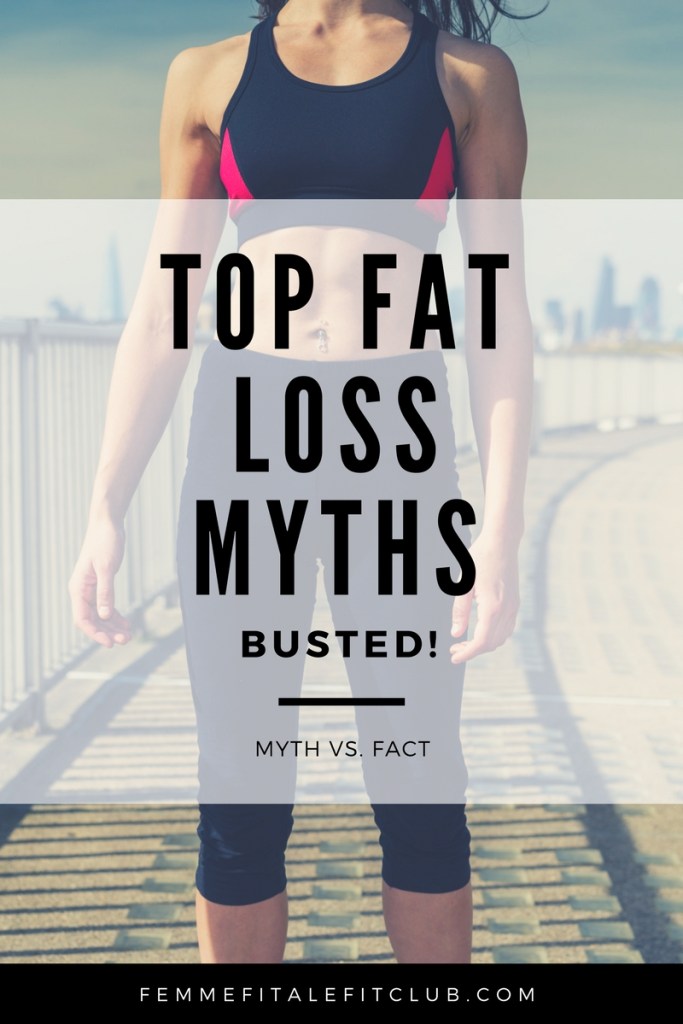
A myth is any widely held belief or idea that a majority of people believe is a fact even though it isn’t. Myths are either unproven or have proven not to work.
If you are planning to shed some pounds, you may be tricked into believing what some ‘self-proclaimed’ health gurus tell you. While you might be tempted to consider the numerous diet tips that are readily available, it is important to remember that healthy weight loss is a long process attained through portion control and eating a balanced diet filled with macronutrients, vitamins, fiber and essential minerals.
[Tweet “Learn how to tell fact from fiction when it comes to successful fat loss. #fitness #fitfam”]
Below are 8 common weight loss myths debunked:
1. Eating after a certain time causes weight gain
Your body cannot tell what time it is. Therefore, it will digest food and drinks the same way regardless of the time. So, it’s about how much and what you take along with your activity level or lack thereof but not necessarily when you eat that leads to weight gain.
2. Skipping meals leads to weight loss
Losing weight is about reducing your caloric intake. When you skip meals, and deny your body some essential nutrients and create too much of a caloric deficit, your body may initially respond with weight loss but eventually will think its starving and store every calorie you consume as fat since it doesn’t know when it will eat again. Or, skipping meals could lead to overindulging in the meals you do have far exceeding your calories for the day. Focus on eating a balanced diet and reasonable portion sizes at each meal.
3. Carbohydrates make you fat
Carbohydrates are an important source of energy and should not be ignored in your diet. Carbs will not make you fat when eaten in the right quantities. Avoid processed and simple carbs because they tend to have low nutritional value, a lot of calories, spike blood sugar and get stored as fat if you aren’t very active. Whole wheat bread and brown rice are some of the complex carbohydrates that you want to consume as they contain fiber, are higher in nutrition and their calorie content is low.
4. Low-fat foods are healthy and can make you lose weight
Most foods labeled as low fat don’t mean that they are low in calories. This is because to make up for the missing fat, manufacturers tend to add extra sugar to make them more palatable and this translates to more calories. Always check the label to find out the sugar and fat content. Another option is to consume more fresh fruits and vegetables that are naturally low in fat and calories.
5. Weight loss diets are effective
Fad diets work in the short term and results are temporary. They make you lose weight by limiting the nutrients that your body requires. This is unhealthy as your body needs a balanced diet to function properly. For healthy weight loss, one should focus on changing your lifestyle and eating habits instead of fad diets.
6. Fast foods are unhealthy and fattening
Apparently, not all fast foods are bad and unhealthy. It is your choice that matters. One cannot just pop into a fast food joint and order a mega size burger with extra-large fries on the side and a huge bottled drink loaded with sugar and expect not to add a few pounds thereafter. However, most fast foods restaurants are now offering healthier choices alongside their main offerings.
7. Certain foods help in losing weight by speeding up your metabolism
Metabolism is the chemical process in which living organisms absorb food to maintain life and for the proper functioning of body organs. This process requires energy which is determined by factors such as age, body size, genes and gender. The claim that certain foods like grapefruit, celery and drinks speed up the rate of metabolism is not entirely unfounded. However, the amount is not significant enough to result in weight loss.
8. You need to exercise daily in order to lose weight.
You burn fat around the clock, whether you exercise or not. Exercise is important in a healthy weight loss journey, and that does not necessarily mean you must engage in an intense fitness regimen at all times whether it be cardio or otherwise. However, exercising 45 to 60 minutes a day, five days a week, will optimize your weight loss efforts.
Conclusion
You can actually lose weight in a healthy way by planning your meals which should include all the essential nutrients your body needs to function properly. Also, ensure that you exercise regularly to build lean muscle and burn fat in order to stay fit. You may want to consult a healthcare professional if you are overly concerned about your weight and a certified personal trainer if you want someone to help customize a fitness training program for you.

5 Replies to "Top Fat Loss Myths Busted!"
Mariya May 14, 2018 (10:54 am)
Too Short content. But Enough information.
Prinze Linda May 24, 2018 (1:11 am)
Hi,
Thanks!
Blog containing a huge informative ideas and experiences.
Cindy May 24, 2018 (4:35 am)
Do waist trainers really help you lose weight?
Active Lifestyle July 11, 2018 (12:46 am)
Your article is helpful for me because of i am a fatty person and now i will act on me. Thank you so much for the share this post.
Femme Fitale Fit Club ® BlogHow To Get Started Losing Weight - Femme Fitale Fit Club ® Blog January 7, 2019 (11:49 am)
[…] wrote an entire post on fat loss and weight loss myths are some […]